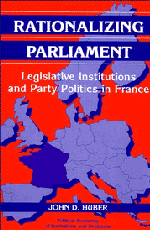Book contents
- Frontmatter
- Contents
- Series editors' preface
- Acknowledgments
- Introduction
- Chapter 1 Parliamentary government in the Fifth Republic
- Chapter 2 Choosing institutions
- Chapter 3 Restrictive procedures and policy conflict
- Chapter 4 Restrictive procedures and bargaining among parties
- Chapter 5 The confidence vote procedure and electoral politics
- Chapter 6 Electoral politics, procedural choice, and the French budget
- CHAPTER 7 Institutional arrangements, political parties, and parliamentary democracy
- Notes
- References
- Index
Chapter 4 - Restrictive procedures and bargaining among parties
Published online by Cambridge University Press: 05 December 2011
- Frontmatter
- Contents
- Series editors' preface
- Acknowledgments
- Introduction
- Chapter 1 Parliamentary government in the Fifth Republic
- Chapter 2 Choosing institutions
- Chapter 3 Restrictive procedures and policy conflict
- Chapter 4 Restrictive procedures and bargaining among parties
- Chapter 5 The confidence vote procedure and electoral politics
- Chapter 6 Electoral politics, procedural choice, and the French budget
- CHAPTER 7 Institutional arrangements, political parties, and parliamentary democracy
- Notes
- References
- Index
Summary
This chapter steps back from the idea that France's restrictive procedures are used to structure bargaining processes between the legislature and executive. Instead, it examines how the two procedures can facilitate bargaining processes among the members of the governmental majority. The theoretical underpinning for the analysis is two themes that emerge from models developed by scholars who study the use of closed amendment rules in the U.S. Congress. The first theme is that institutional arrangements in general, and restrictive legislative procedures in particular, play a central role in preserving gains from trade between parties and party factions when policies are chosen on more than one policy dimension at a time. The second theme is that restrictive procedures are important tools for hastening the legislative process when the government faces important time constraints and policies are chosen on more than one dimension.
The chapter has three parts. The first part discusses how one can apply insights from the ‘gains from trade’ models to the French context. It then tests these insights empirically. The second part discusses how one can apply the ‘time constraints’ models to the French context. It then tests these insights empirically. The third part undertakes multivariate tests of the hypotheses developed in this chapter and Chapter 3.
DIMENSIONAL COMPLEXITY AND RESTRICTIVE PROCEDURES
When applied to the case of France, three hypotheses emerge from the ‘American’ models that link the use of closed rules in the House to the problems inherent to choosing policies by majority rules in multidimensional policy spaces:
Hypothesis 1: The probability of the government using the restrictive procedures should increase on ‘distributive bills’ that disburse fixed state resources.
- Type
- Chapter
- Information
- Rationalizing ParliamentLegislative Institutions and Party Politics in France, pp. 82 - 111Publisher: Cambridge University PressPrint publication year: 1996

